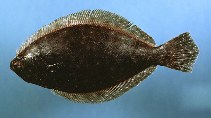| Family: |
Paralichthyidae (Large-tooth flounders) |
| Max. size: |
94 cm TL (male/unsexed); max.weight: 12 kg; max. reported age: 9 years |
| Environment: |
demersal; brackish; marine; depth range 10 - 183 m, oceanodromous |
| Distribution: |
Northwest Atlantic: Maine (rarely Nova Scotia, Canada) to southern Florida, USA. |
| Diagnosis: |
|
| Biology: |
Adults usually prefer hard sandy substrate where they can burrow; can exploit a broad range of lower and mid-estuary habitats including salt marsh creeks and seagrass beds, which usually have muddy or silty substrates , as well as sand flats (Ref. 26621). Occur in bays, lagoons and shallow coastal waters. Utilized fresh and frozen; can be steamed, fried, boiled, microwaved and baked (Ref. 9988). Exported fresh to Japan for sashimi. |
| IUCN Red List Status: |
Least Concern (LC); Date assessed: 04 February 2009 Ref. (130435)
|
| Threat to humans: |
other |
Source and more info: www.fishbase.org. For personal, classroom, and other internal use only. Not for publication.
